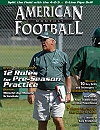Article CategoriesAFM Magazine
|
Your Take – The New-Age of the Agent and the Tactics They Employby: Ralph HarrisHead Coach, East Texas Baptist Universit © More from this issue Over the past year, the NCAA’s agents, gambling and amateurism staff has begun to address the issue of the new-age agent. The new-age agent will not be wearing a suit, he will not be a recognizable face, and he won’t wait for an school’s “agent day” to try and contact student-athletes. Agents of the past presented themselves as executives who established relationships and gained clients by any and all means. Today, some examples of the new faces of “agents” include another student, a former student-athlete, or a high school friend of a student-athlete who is trying to become a player in the agent game. These individuals receive compensation for helping land clients for other well-known agents and are promised compensation. However, in doing so, unfortunately they may cost college student-athletes one or more Saturdays in ....The full article can only be seen by subscribers.
|
|
|||||||
| HOME |
MAGAZINE |
SUBSCRIBE | ONLINE COLUMNISTS | COACHING VIDEOS |
Copyright 2026, AmericanFootballMonthly.com
All Rights Reserved





